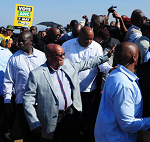The recently held general elections in South Africa, which happened to coincide with the country completing two decades of democracy, concluded in an emphatic 62.16% victory for the African National Congress party(ANC), putting President Jacob Zuma on the path to a second term in office. The ANC has won all the national elections since democracy was established in South Africa in 1999.
However, this election was a stern test for President Zuma who had a tumultuous first term in office. Since 2009, when he first took charge, unemployment has steadily risen, as has corruption. There have also been violent labour strikes fuelled by the widening inequalities in income. In 2009, South Africa was ranked 54 in the Corruption Perception Index, brought out by Transparency International. Currently it stands at 72. The last straw was the ignominy of security upgrades worth 246 million Rand in President Zuma’s homestead in Nkandla – most of which was redirected from resources allocated to improving infrastructure in poor townships which have been agitating for better public services. Zuma and his aides have refused to take responsibility and instead put the blame on unscrupulous contractors for inflating costs.
Zuma has positioned himself as a victim of those who want to take advantage of his name. Recently he remarked that those questioning the opulent upgrades in his homestead are “the bright, clever people” – a reference to the country’s increasingly critical black middle class whose support the ANC has traditionally counted upon given its history as leader of the fight against apartheid. In defence of the money spent on his home, Zuma has pointed out that his house was burnt down and one of his wives raped during the height of violence in the 1990s.
The reality is that since 2009, the party’s electoral base has been in gradual decline, especially among the middle class. In 1994, under President Nelson Mandela, the ANC received 62.65% of the total votes nationally. Five years later, under President Thabo Mbeki this increased to 66.35%. At the start of Mbeki’s second term, the party won 69.9% of the votes. The first noticeable drop was in 2009 when the ANC won 65.90% of the seats. In 2014, this has dropped to 62.16%.
That the ANC managed to corner a majority of the votes despite its poor record is a reflection of the lack of choices. A majority of black South Africans don’t believe the opposition is fit to govern. The main opposition party, Democratic Alliance, is seen to represent the interests of the white minority in a country where racial divisions still run deep. The smaller parties are too insignificant to make any changes at the local or national level.
While supporters of the ANC may be celebrating, the party is more vulnerable than before. The Julius Malema-led Economic Freedom Fighters (EFF), a new party on the radical left launched last year by former ANC Youth League leaders received 6% votes, eating into a fraction of the ruling party’s support base. In Gauteng, South Africa’s economic hub, it got 10.3%, which is quite significant for a start-up. The EFF’s appeal lies in its grassroots campaigning style and the ability to connect with the marginalised, while remaining attractive to sections of the black middle class for whom race remains an issue in a predominantly white corporate South Africa.
Another modest winner is the Democratic Alliance which won 22% of the seats. It may have failed to attain its stated goal of sweeping the ANC off its perch in Gauteng, yet the DA’s growth is remarkable given that it is seen as representing white interests.
The ANC’s electoral showing does not reflect the gloomy economic state of South Africa or the deep concerns about corruption. Zuma has weathered these challenges successfully, and proved that the ANC continues to occupy the pride of place in the hearts and minds of black South Africans who are on the margins of the economy. In the absence of a credible opposition party, the black majority will always tie their fortunes with the ANC, until the ill-effects of its governance deepen the economic crisis in ways that directly threaten standards of living.
Dr Mzukisi Qobo teaches politics at the University of Pretoria and is Deputy Director: Centre for the Study of Governance Innovation at the same university.
This blog was exclusively written for Gateway House: Indian Council on Global Relations. You can read more exclusive content here.
For interview requests with the author, or for permission to republish, please contact outreach@gatewayhouse.in.
© Copyright 2014 Gateway House: Indian Council on Global Relations. All rights reserved. Any unauthorized copying or reproduction is strictly prohibited


